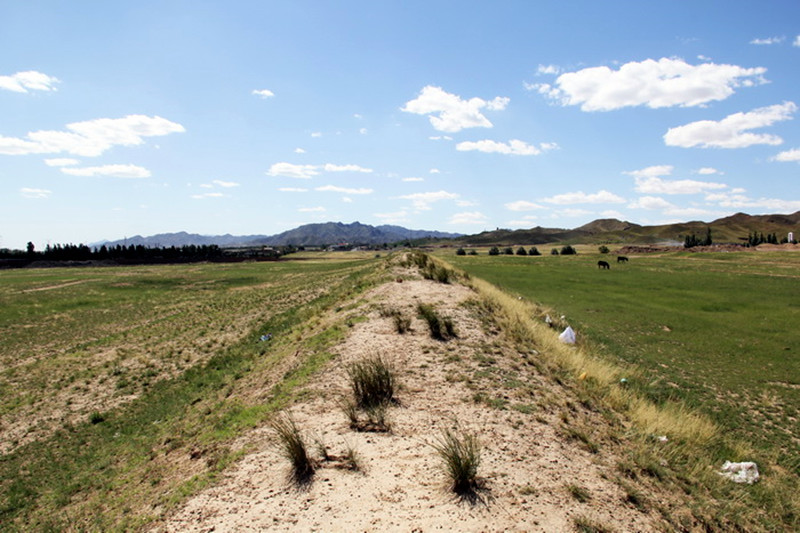"Qin Shi Mingyue Han Shi Guan, the Long March people have not returned." But to make the Dragon City fly will be, not to teach Humadu Yin Mountain. (Tang Wang Changling, "Out of the Plug")
The Yinshan Mountains, stretching more than a thousand kilometers from east to west, are geographically the dividing line between monsoon and non-monsoon zones, and in the historical sense, they are at the forefront of conquest and blending between farming peoples and nomadic tribes.
During the Warring States period, the Xiongnu's sphere of influence was centered on the Yinshan Mountains.
The great chieftain ManDan Yu once heard his grandfather tell him: That year, the spring thunder in the depths of the grassland came particularly early, which seemed to indicate something ominous.
The "Chronicle of the Xiongnu" records: "King Wuling of Zhao also changed his vulgar hu costume, learned to ride and shoot, broke the forest hu and Lou Fu in the north, built the Great Wall, and built the Great Wall from the dynasty to the Yin Mountain, and the highest que was stopped." ”
King Wuling of Zhao was not only a reformer, but also a strategist. "Shi Yi has a long skill to control Yi", I don't know if Mr. Wei Yuan had flashed the shadow of King Zhao Wuling in his mind when he compiled the "Chart of the Sea Kingdom". King Wuling of Zhao vigorously promoted the strategy of "using Hu to subdue Hu" and drove the Hu people from the vast plains into the depths of the Yin Mountains. Subsequently, a long border wall was built on top of the newly occupied land. This Warring States Zhao Great Wall, built about 300 BC, predates the Ming Great Wall in Badaling, Beijing, more than 1,800 years ago.

Remains of the Great Wall of Northern Zhao of the Warring States (in Baotou, Inner Mongolia)
However, King Wuling of Zhao was also a tragic figure. The woman he loved, blowing the pillow wind, wanted to make his son a prince. The pillow side wind, like the bone sponge palm, is feminine but has extraordinary lethality. As a result, the original prince was deposed and the new prince ascended to the throne. Soon, King Zhao Wuling's heart hesitated again. Anyone who has read Chinese history knows that any king who swings on the matter of making a prince can hardly have a good ending.
Since ancient times, in order to seize the throne, many great dramas have been staged to kill fathers and brothers. The difference between Zhao Wuling's thoughts allowed him to also play the protagonist of the tragedy.
In 295 BC, conflict broke out, the former crown prince was killed, and King Wuling of Zhao was trapped in the Dune Palace, which is now Guangzong County, Xingtai City, Hebei Province. King Wuling of Zhao, who had been cut off from water and food, was placed under house arrest alone in the dune palace, so hungry and dizzy that he had to barely climb the tall trees in the courtyard and eat chicks from the bird's nest. Three months later, the gate of the Dune Palace was finally opened, and the corpse of a generation of heroic zhao Wuling kings was already unbearable to see.
In 222 BC, Qin destroyed the Zhao state.
"The trees fell and scattered", and overnight, the Zhao Guoshi soldiers guarding the Great Wall fled cleanly.
By this time, Touman Shan Yu had already grasped the authority of the Xiongnu. With a victorious smile on his face, he rode a war horse and calmly left the depths of the Yin Mountains and set foot on the plains at the southern foot of the Yin Mountains.
This plain, later known as the "Shule River". The Shule River, under the Yin Mountains. The sky is like a vault, and the cage covers the four fields. The sky is clear and the wilderness is vast. Wind blowing grass low to see cattle and sheep.
The Shule River at the foot of the Yin Mountains (in Baotou, Inner Mongolia)
Soon, he led his troops across the Yellow River and into "Henan Province". Henan is not the land of today's Henan Province. The Yellow River, in northern China, draws a large "several" character. In ancient times, the Wujia River was the main stream of the Yellow River. Therefore, "HenanDi" refers to the land north of Jizi Bay and the south side of the Yellow River, which scholars also call "Hetaodi", that is, the northern part of the present-day City of Ordos and Bayannaoer City.
However, Touman's triumphant laughter did not reverberate in Henan for long. Soon, Qin Shi Huang, who unified the six kingdoms, stared at the fierce gaze, threw down the soldier's charm, and mobilized 300,000 troops. Two tigers fighting each other, who can laugh to the end?
For more information, listen to the next breakdown.